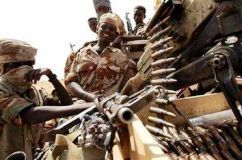All Darfur conflict parties breach arms embargo – UN experts
Oct 11, 2006 (UNITED NATIONS) — All parties operating in the Sudan’s war-torn region of Darfur are manifestly violating the arms embargo in the region, a UN report said today.
 According to the latest report from a panel of experts set up by the United Nations Security Council, all the parties in Darfur conflict including government forces, allied Janjaweed militias, rebel groups and insurgents from neighbouring Chad, are blatantly breaching a UN arm embargo imposed in Darfur.
According to the latest report from a panel of experts set up by the United Nations Security Council, all the parties in Darfur conflict including government forces, allied Janjaweed militias, rebel groups and insurgents from neighbouring Chad, are blatantly breaching a UN arm embargo imposed in Darfur.
The panel’s report, released Wednesday, found that Chadian rebels are helping to stoke the conflict in Darfur — especially in the region’s north and west — by reportedly joining Government forces and the Janjaweed in their operations against rebel groups.
The experts said there are reliable reports that Sudan is re-supplying the Chadian rebels with weapons and vehicles, with weapons and ammunition observed being offloaded at local airports and moved to locations within Darfur, where three years of fighting have killed an estimated 200,000 people and forced another 2 million to leave their homes.
“Credible information” also exists indicating the Government continues to support the Janjaweed, providing weapons and vehicles in breach of its commitments, according to the report.
“The Janjaweed/armed militias appear to have upgraded their modus operandi from horses, camels and AK-47s to land cruisers, pick-up trucks and rocket-propelled grenades,” it stated.
The panel of experts, appointed by the Council last year to monitor the arms embargo and targeted financial and travel-related sanctions, also found that rebel forces have “shown a notable increase in capacity to engage the forces of the Government” since March.
Turning to the financial and travel-related sanctions, the experts said it considered Sudan to have “wilfully avoided” its commitment under the resolution to implement financial sanctions against persons designated by the Council.
They also voiced concern that fighting has increased in recent months because of a major split within rebel movements based on which groups and factions signed the Darfur Peace Agreement (DPA) in May and which did not.
“Tragically, it is the long-suffering innocent civilians of Darfur who continue to bear the brunt of recent events.”
Greece’s Ambassador Adamantios Vassilakis, Chairman of the Council committee dealing with sanctions concerning Sudan, said in a letter to the Council President that the committee will consider the panel’s many recommendations and then present their views to the full Council.
Meanwhile, Under-Secretary-General for Humanitarian Affairs Jan Egeland told a news briefing in Geneva that the violence and insecurity plaguing Darfur has escalated in recent months, with the militias stronger than ever.
“They are much better armed, they are more brutal than ever and their potential to do bad is better than ever,” he said.
Mr. Egeland, who is also the UN Emergency Relief Coordinator, said the escalating fighting has led to surging numbers of internally displaced persons (IDPs) across Darfur, a remote and impoverished region the size of France on Sudan’s western flank.
Their suffering has been exacerbated because relief workers are unable to reach many of the IDPs due to the insecurity.
Asked by journalists about the recent Human Rights Council session, Mr. Egeland said he thought it was a shame that it did not issue a strong statement on Darfur.
“I think that is a very bad signal. There are few cases that are so clear-cut as Darfur in terms of women and children being abused, attacked [and] raped by armed men. And if there is one thing that the Human Rights Council should do, it is to come to the defence of the defenceless.”
(ST)
